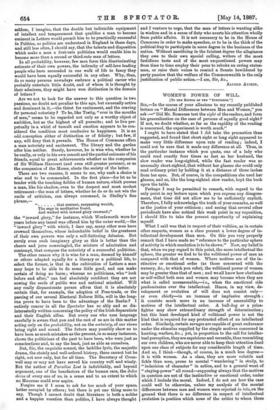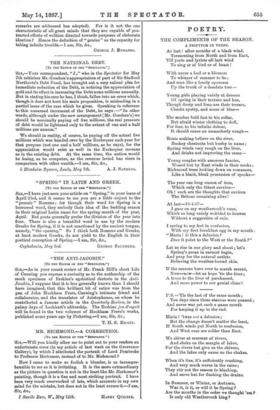WOMEN'S POWER OF WILL.
[To THE EDITOR 07 Tex " SPECIATOB..1 Srn,—In the course of your allusions to my recently published lecture on "Mental Differences between Men and Women," you ask :—" Did Mr. Romans test the eight of the readers, and form his generalisation on the case of persons of equally good sight 1a If not, we doubt whether, so far as the rapidity of the reading is concerned, the experiment is worth much."
I ought to have stated that I did take the precaution thus suggested, and found that short sight or long sight appeared to make very little difference upon rate of reading ; indeed, I could not be sure that it made any difference at all. Thus, in the particular instance which you quote, one of a lady who- could read exactly four times as fast as her husband, the reader was long-sighted, while the fast reader was so unusually short-sighted, that without her glasses she could only read ordinary print by holding it at a distance of three inches. from her eyes. But, of course, in the competitions she used her glasses, and so, like the long-sighted slow reader, kept the book upon the table.
Perhaps I may be permitted to remark, with regard to the only point in my lecture upon which you express any disagree- ment, that time did not allow me to be sufficiently explicit. Therefore, I fully acknowledge the truth of your remarks, as well as the justice of your criticism ; and seeing that several other periodicals have also noticed this weak point in my exposition, I should like to take the present opportunity of explaining myself.
What I said was that in respect of their volition, as in certain. other respects, women as a class present a lower degree of in- tellectual development than men. On this you very properly remark that I have made no " reference to the particular sphere of activity in which resolution is to be shown." Now, my belief is. that, when we pay regard to this point, the more intellectual the sphere, the greater we find to be the volitional power of men as compared with that of women. Where motives are of the in- stinctive or emotional order (as those concerned with the nursery, &c., to which yon refer), the volitional power of women may be greater than that of men ; and we all know how obstinate- or self-willed both men and women may become when they are what is called unreasonable,—i.e., when the emotional side predominates over the intellectual. Hence, in my view, de- velopment or evolution of will does not consist only— or even chiefly—in an increase of implosive strength it consists much more in an increase of amenability to. motives of the intellectual order. A bull-dog or a prize- fighter may show extraordinary strength of determination ; but this least developed kind of volitional power is not the kind that is required for any protracted effort of an intellectual order. Similarly, certain savages are capable of great endurance under the stimulus supplied by the simple motives concerned in hunting, warfare, Jo. ; yet, in proportion to the call for intellec- tual perception, they are capricious and versatile, thus resembling our own children, who are never able to keep their attention fixed: upon one class of subjects for any considerable length of time. And so, I think—though, of course, in a much less degree— it is with women. As a class, they are more volatile and fickle than men, prone to mental " wandering" in study, to " indecision of character " in action, and to a general want of " staying-power " all round—supposing always that the motives in question are not of the instinctive or emotional order, under which I include the moral. Indeed, I do not see how the case could well be otherwise, unless my analysis of the mental differences between men and women were rejected in tot°, on the ground that there is no difference in respect of intellectual evolution (a position which none of the critics to whom these
remarks are addressed has adopted). For is it not the one characteristic of all great minds that they are capable of pro- tracted efforts of volition directed towards purposes of elaborate ideation P Hence the definition of "genius" as the capacity for taking infinite trouble.—I am, Sir, em.,
GEORGE J. ROMANES.



































 Previous page
Previous page